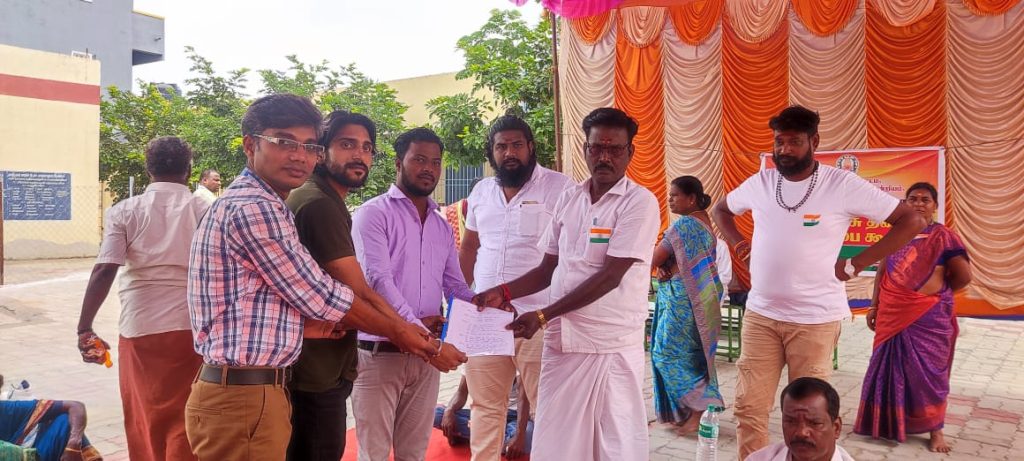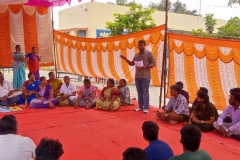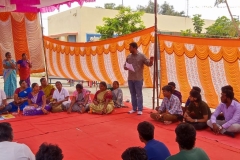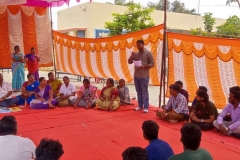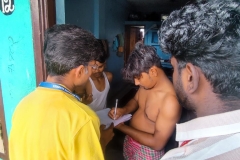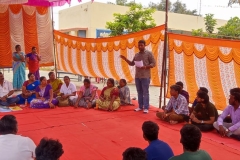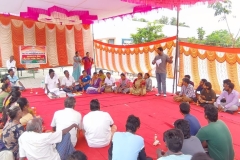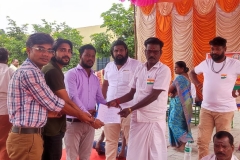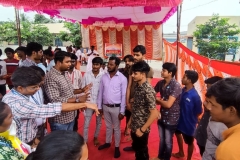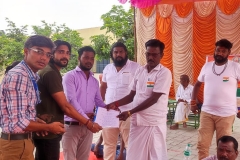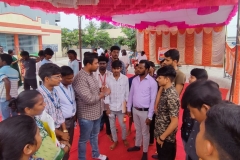Grama Sabha at Mambakkam
Situated in the Sriperumbudur ward, Mambakkam Village exemplifies the significance of grassroots governance through its recurring Grama Sabha meetings. These assemblies serve as pivotal components of participatory democracy, providing a platform for collective deliberation and decision-making. The Grama Sabha held on January 26, 2024, at 11 a.m., in the Sriperumbudur block, specifically at Mambakkam Village, stands as a testament to the community’s commitment to substantive discourse on matters integral to its welfare.
Presided over by President Venkatesan, with Ananda as the Clerk, the leadership team, including the Vice President, Village Administration Officer, and Headmaster, contributed their expertise. Two police officers ensured a secure environment for the assembly. Fr. Simolin, the Director of Don Bosco Migrant Services, and Sr. Punitha, serving as the Legal Adviser, provided valuable insights. Mr. SauravMondal of Caritas India played a pivotal role, facilitating the program for the community, along with 60 migrant workers. Mr. Gopal, the field coordinator of DBMS, added to the overall development goals.
Education found representation through students from various institutions, contributing diverse perspectives. Gokulraj from the Madras School of Social Work, Sanjay Kumar and Moses Immanuel from Mar Gregorios College of Arts and Science, and Antony and Joe from Loyola College actively engaged in discussions, reflecting the commitment of the younger generation to community development.
The Grama Sabha discussions unfolded, with President Venkatesanskillfully facilitating, ensuring all voices were heard. The collective effort addressed immediate concerns and long-term development goals, with Fr. Simolin providing guidance on aligning community initiatives with broader developmental strategies.
The meeting transitioned into an interactive session initiated by Clerk Ananda, where villagers expressed the need for transparency through an annual report. Responding to concerns raised by Fr. Simolin, Mr. Saurav, and migrant workers, President Venkatesan was requested to address these needs formally.
Recognizing the need for inclusivity, President Venkatesan engaged in a constructive dialogue, offering valuable suggestions on integrating migrant workers into the community. Fr. Simolin proposed a structured solution, wherein Caritas India would support registered migrant workers with a shared responsibility model, addressing immediate needs and facilitating integration.
A series of meetings, organized by Fr. Simolin and Mr. Saurav, aimed at building connections and understanding migrant workers’ needs. Discussions covered topics such as local culture, housing, healthcare, education, and the support offered by Caritas India. Migrant workers expressed a desire for quality education for their children, and Fr. Simolin assured steps would be taken.
The proactive approach of President Venkatesan in organizing these meetings showcased a commitment to inclusivity, social integration, and community well-being. The decision to engage Fr. Simolin and Mr. Saurav reflected a focus on meaningful connections, understanding individual narratives, and fostering a sense of community among all residents.
The meetings not only facilitated information exchange but also symbolized a collaborative effort to bridge the gap between the established community and recent arrivals. Fr. Simolin’s empathetic approach, coupled with Caritas India’s comprehensive support, aimed to create a community where everyone could thrive and contribute.
The Grama Sabha, under President Venkatesan’s leadership, became a dynamic platform for community engagement and inclusive development. The response to migrant workers’ challenges showcased proactive leadership, fostering unity and prosperity. The commitment to register migrant workers under Caritas India emphasized shared responsibility and a sense of belonging within the community.
In conclusion, Mambakkam Village demonstrated the strength of community bonds and the potential for positive change when diverse stakeholders come together. The principles of compassion, collaboration, and shared responsibility will continue to guide the village towards a thriving, integrated, and harmonious community in its journey of sustainable development.
